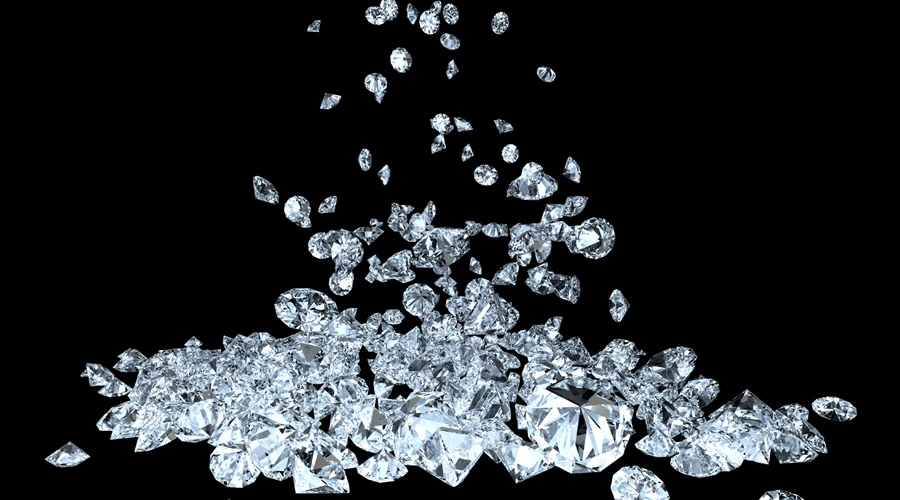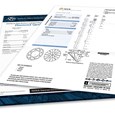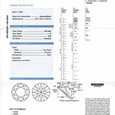Sign up for our Newsletter
Why Should I Buy A Certified Diamond?
If you’re thinking about buying diamond jewellery chances are you’ve encountered the giant, floating question that is ‘Should I buy certified or non-certified diamonds?’.
The reason that question is so giant and floating is that some people – many of whom really should know better – continue to argue that it’s okay to buy uncertified diamonds.
What is a buyer to do?
We know you just want to make the right decision, so we've put together this straightforward guide to diamond certification, to help you decide for yourself.
Stay tuned for:
- what a 'certified diamond' is and what does a diamond certificate do
- why diamond certification even exists, and
- the differences between certified, non-certified and self-certified diamonds
What does ‘certified’ mean?
It’s worth hitting the books here if only to underline what an astoundingly important word ‘certified’ is. Freedictionary.org defines it as:
- to confirm formally as true, accurate, or genuine
- to guarantee meeting a standard
In the case of diamonds, being certified means:
- that the diamond is verified as being either 100% natural, lab-grown or enhanced
- that the quality of the diamond (colour, clarity, and often cut) meets a certain standard, in the opinion of a qualified, experienced gemmologist.
Burning Questions
What's an enhanced diamond?
Enhanced diamonds are cheaper, low-quality diamonds that have been artificially treated with the gemstone equivalent of plastic surgery to make them appear of higher quality. These treatments include laser drilling to remove visible inclusions, fracture-filling to hide small internal cracks, and colour-treating to give a diamond either more or less colour.
Can enhanced diamonds be certified?
Some diamond grading labs refuse to certify enhanced diamonds. Others will note on the certificate that the diamond has been enhanced and how. The seller is obliged to tell you if a diamond has been enhanced but check the certificate to make sure.
What is a diamond certificate?
A diamond certificate is simply a piece of paper or a link to an online document. It’s sometimes called a diamond grading report or dossier, or diamond analysis document. Call it a banana if you like, it's what's on it that counts.
A typical diamond certificate tells you about the gems:
- shape and dimensions
- carat weight
- colour and clarity grades
- standard of finish (i.e. polish, symmetry, girdle width)
- and, in the case of Round Brilliant diamonds - cut grade
When you buy a certified diamond, if you receive a paper certificate, keep it in a safe place (but not with the diamond itself, just in case) – you'll need it to appraise, insure or sell the stone. For future reference, independent laboratories are moving towards laser inscribing the certificate number on the girdle of the diamond, and then giving a link to an electronic version of the certificate, to save printing, which is better for the environment.
Burning Questions
Is a diamond certificate the same as a diamond appraisal?
No. A diamond certificate describes and grades the diamond whereas an appraisal values the diamond according to current market prices. However, if present, the certificate is used to help appraisers determine the insurance or replacement value of a diamond and having a certificate usually means the stone will be given a higher value.
Does certification mean a diamond isn’t a blood diamond?
No. The certificate only assesses the diamond’s physical attributes, not its origins. Check the seller's policy to make sure they only buy and sell conflict-free diamonds.
Why do diamonds need to be certified?
In a nutshell, diamond certificates exist to protect you, the buyer. To demonstrate, let’s imagine what might happen in a world where diamonds aren’t certified.
Picture the scene:
- DIAMOND SELLER (holding up a diamond): This is a 1.8-carat, flawless, D colour-grade diamond
- YOU (squinting at said diamond): Are you sure?
- DIAMOND SELLER: Yes.
- YOU: Oh, okay. Here’s my credit card, Mr Diamond Seller
Now let’s imagine that same scene using a certified diamond:
- DIAMOND SELLER (holding up a diamond): This is a 1.8-carat, flawless, D colour-grade diamond
- YOU (squinting at said diamond): Are you sure?
- DIAMOND SELLER: Yes. And to prove it here is the diamond certificate from a respected independent laboratory
- YOU: Oh, okay. Here’s my credit card, Mr Diamond Seller
Clearly, in the first example, you only have Mr Diamond Seller’s word that the diamond is what he says it is. Even if he’s the most trustworthy retailer in the world, that’s still a lot to ask of you when you’re buying something as precious as a diamond.
The trouble with diamonds is that, without a certificate, you only have your eyes to rely on – and it is extremely difficult for anyone who isn’t a gemmologist to know the quality, clarity, colour grade and carat weight of a diamond by just looking at it. Yet these things dramatically affect the value. Having a certificate to confirm these things protects both you and the seller.
Now to the thorny issue of self-certification…
Q. When is a diamond certificate, not a diamond certificate?
A. When it's issued by the seller themselves!
Perhaps the single most important thing about a diamond certificate is where it comes from. To be of any use, the diamond must be certified by an independent, respected gemmological laboratory such as GIA, AGS, HRD, IGI or EGL.
Certifying a diamond costs money so some retailers sell uncertified diamonds to be more competitive on price. However, they also know that people are put off by uncertified diamonds so in certain cases they self-certify – that is, they buy uncertified diamonds, grade them in-house and issue their own certificate. In some shady cases, they buy a certified diamond, then dispose of the certificate and grade it in-house to make the diamond appear better than it is, thus making it appear better value for money!
In a nutshell, the only difference between an uncertified diamond and a self-certified diamond is that the retailer who self-certifies it has done some printing!
Burning Questions
What happens if I buy an uncertified or self-certified diamond?
It can be very tempting to buy uncertified or self-certified diamonds because they usually appear cheaper than certified stones. But before you grab that uncertified bargain, bear in mind you run the risk of not getting exactly what you paid for.
Gem labs use very strict criteria to grade diamonds. An uncertified or self-certified diamond advertised as colour grade F may turn out to be more like a G or even an H colour grade when compared with an independently certified diamond, meaning that, like for like, you have probably paid more than you should have!
Retailer-issued certificates are also not valid in the eyes of an appraiser.
The Difference Between Certified, Uncertified and Self-Certified Diamonds
By now, you should see why the majority of ethical, reliable diamond retailers only sell independently certified diamonds. But if you’re still not sure (or you skim-read) here’s our Certified vs Uncertified vs Self-Certified Diamonds Showdown:
Certified Diamonds
- Verifies that the diamond is 100% natural or enhanced: YES
- Gives you an experienced, third-party quality grading: YES
- Allows you to comparison shop to get the best price: YES
- Adds value to the diamond: YES
Uncertified Diamonds
- Verifies that the diamond is 100% natural or enhanced: NO
- Gives you an experienced, third-party quality grading: NO
- Allows you to comparison shop to get the best price: NO
- Adds value to the diamond: NO
Self-Certified Diamonds
- Verifies that the diamond is 100% natural or enhanced: MAYBE
- Gives you an experienced, third-party quality grading: NO
- Allows you to comparison shop to get the best price: NO
- Adds value to the diamond: NO
The Bottom Line
If you remember nothing else, remember this:
Unless you’re very experienced in buying diamonds and feel confident evaluating the quality of a diamond yourself, buy certified. That way, you know the diamond you’re getting is exactly the same quality that you’re paying for.
If you have any questions about any of the information above, we have diamond experts on hand to advise and help you find the perfect diamond. Contact us here
-
Ethically Sourced Diamonds
-
Handmade in the UK
-
FREE Shipping Worldwide
-
60 Day Returns



